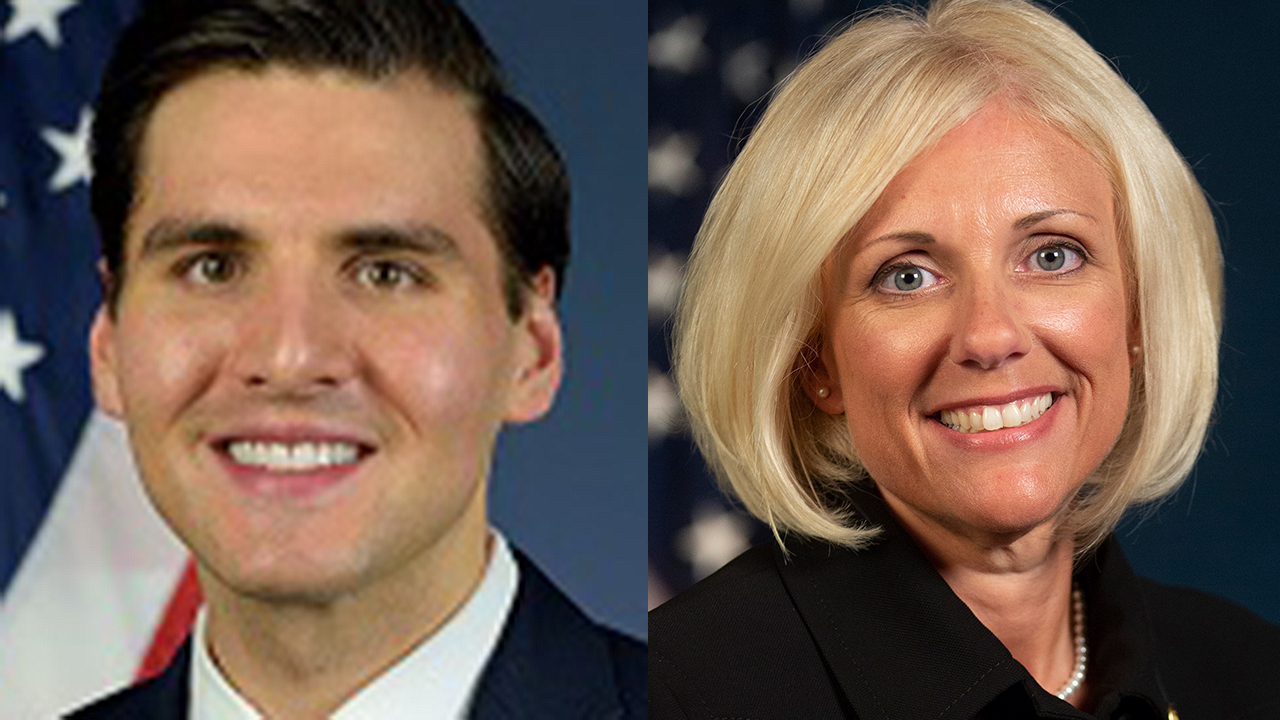
STB’s Fuchs, NTSB’s Homendy Senate-Confirmed
Written by Frank N. Wilner, Capitol Hill Contributing Editor
Patrick Fuchs and Jennifer Homendy. U.S. government photos.
Surface Transportation Board (STB) member Patrick J. Fuchs, a Republican, was Senate-confirmed by voice vote May 14 to a second five-year term, while Democrat Jennifer Esposito Homendy was similarly confirmed both to a second term on the National Transportation Safety Board (NTSB) and as its chairperson.
Railway Age reported in April the likely pairing for the Senate floor vote. Neither faced vocalized political opposition and both had industry and labor support—Fuchs in the rail sector and Homendy among all modes.
Fuchs was first nominated to the five-member STB by President Trump in 2018 and Senate-confirmed in January 2019 to one of two new seats created by the 2015 Surface Transportation Board Reauthorization Act that Fuchs helped write while a Senate Commerce Committee senior staffer. Fuchs’ latest Senate confirmation—to a second five-year term expiring in January 2029—follows a January President Biden nomination. STB members are limited by statute to two terms.
Upon first taking the oath of office at age 30 in 2019, Fuchs was the second youngest rail regulator since the 1887 creation of STB predecessor Interstate Commerce Commission (ICC). Former ICC chairperson Heather Jane Gradison was the youngest, at age 29, when taking office in 1982. The two oldest to have taken office were recently retired STB Chairperson Martin J. Oberman, 73 when taking office in 2019, and current member Karen J. Hedlund, 73, when sworn-in in 2021.
The 52-year-old Homendy, twice a Trump nominee, was first Senate-confirmed to the five-member NTSB in 2018 to fill an unexpired seat, and Senate-confirmed in 2019 to a second full five-year term. In 2021, she was Senate-confirmed as NTSB chairperson—a three-year position—following a Biden nomination. Biden renominated Homendy to both posts earlier this year, for which she gained Senate confirmation May 14. The NTSB statute does not provide for term limits. And unlike the STB statute that allows for a maximum 12-month holdover when the second term expires, NTSB members may remain in place indefinitely—including as chairperson—pending Senate confirmation of a successor.
In nominating Fuchs to his second term, Biden said he had, during his first term, “advanced transportation policies that address unreasonable practices and inadequate service, adjudicated railroad transactions that generated new capital investment and routing options, and streamlined inefficient processes that unduly burden the public.” Additionally, said Biden, when Fuchs was a Senate staff member, he “played an integral role in the development and enactment of significant railroad legislation, including the reform of railroad infrastructure programs and the first reauthorization of the STB” since its 1996 creation.
Other legislation Fuchs helped draft included the rail and hazardous materials titles of the Fixing America’s Surface Transportation (FAST) Act—the first rail passenger service reauthorization in almost a decade that instituted reforms improving Amtrak’s permitting and performance, encouraged private-sector competition on routes and created the Consolidated Rail Infrastructure and Safety Improvements (CRISI) program that is a major source of short line railroad capital improvement funding.
Shippers, in letters of support, described Fuchs as “calm,” “solid,” “transparent” and “seriously thoughtful.”
Fuchs earned from the University of Wisconsin a double-major undergraduate degree in economics and political science, and a master’s degree in public policy analysis and management, with an emphasis on transportation policy, economics and statistics. As a graduate student, he participated in an international academic program with the National University of Singapore, focusing on international policy and economics.
Prior to joining the Senate Commerce Committee’s Republican staff in January 2015, Fuchs was a policy analyst with the White House Office of Management and Budget, a State Department Presidential Management Fellow serving in The Hague, Netherlands, and a research assistant at the National Center for Freight and Infrastructure Research and Education.
Homendy is a career civil servant with a reputation for transparency, steadfast adherence to just-the-facts conclusions and being strong willed. She will long be remembered for an appearance before a congressional oversight committee into rail safety where Association of American Railroads President Ian Jefferies—himself a former Senate Commerce Committee Democratic staffer—sought to monopolize the record, only to be cut short by Homendy, who said into a microphone, “This question is for me, and I’d like to answer it.”
During high school, Homendy worked in Georgia Republican Newt Gingrich’s House office; while pursuing a degree in humanities at Penn State, she worked for Sen. Arlen Specter (R-Pa., who later became a Democrat); and following college, worked briefly for Rep. Lamar Smith (R-Tex.). Post-college, Homendy gained government affairs experience with the National Federation of Independent Business and American Iron and Steel Institute, which led to positions with the AFL-CIO Transportation Trades Department and the Teamsters Union.
In 2004, she became Democratic staff director for the House Rail Subcommittee, where she helped draft two significant railroad bills: The 2008 Rail Safety Improvement Act mandated implementation of Positive Train Control, limited train crew hours of service and tightened training standards. The 2009 Passenger Rail Investment and Improvement Act instructed the STB to establish metrics and standards for Amtrak passenger trains hosted on freight rail tracks. Since her elevation in 2021 to NTSB chairperson, Homendy has become a familiar face on television news shows following major transportation accidents.
While the NTSB now is fully staffed at five members, the May 10 retirement of STB’s Oberman leaves the five-member STB evenly divided politically. Democrat Robert E. Primus, 56, whose second term expires in December 2027, was named by Biden as Oberman’s successor as chairperson. Unlike the NTSB, the STB statute does not require Senate confirmation of a Presidentially selected chairperson.
The second STB Democrat (with Primus) is Hedlund, whose first term expires in December 2025, while the second Republican (with Fuchs) is Michelle A. Schultz, 52, whose first term expires in January 2026.
Although the independent (from the Executive Branch) STB historically has avoided political partisanship, it is recognized that Democrats and Republicans traditionally have different viewpoints on regulatory issues. Without a political majority, Primus—not known for flexibility and compromise—may find himself unable to move controversial decisions.
As Railway Age reported in April, five Democratic names are on a White House short list to succeed Oberman, but the likelihood of a Democratic nominee gaining Senate confirmation this year is problematic. Senate Republicans, who can block a floor vote on a nominee, will want to keep the Oberman Democratic seat vacant for nomination of a Republican by Donald Trump, should he be elected in November.
Whether Republican Fuchs—whose knowledge of freight rail operations and economics is far greater than other STB members—will be in line for the STB chair in a second Trump Administration cannot be assumed. Trump-backing Washington think tanks, such as the Heritage Foundation, will be pushing for an aggressive and unbending anti-regulatory candidate for both the Oberman vacancy and STB chair.
By contrast, Fuchs distinguished himself—as oft recognized by Oberman—as a leader capable of collaboration and compromise to move controversial matters to fruition. Notably, the purpose of the 2015 STB reauthorization’s expansion of the STB from three to five members—language actually drafted at the Senate Commerce Committee by Fuchs—was to navigate government-in-sunshine strictures to allow for one-on-one conversations so long as the two are not a majority.
While another name or two could surface, the five names now in play include Chicago Metra board member Melinda Bush; Chicago Transit Authority President Dorval Carter Jr.; former House Transportation & Infrastructure (T&I) Committee Chairperson Peter DeFazio of Oregon; former congresswoman Marie Newman of a nearby-Chicago county; and Chicago-rooted Senate Commerce Committee staffer Melissa Porter.
Except for Porter, all tote problematic baggage. Bush may be the leading candidate, while Porter, now that Biden named Primus chairperson, may have lost interest.
- Melinda Bush, 67, a former labor union leader, joined Chicago Metra’s board in 2023. Previously, she was vice chair of the state senate’s transportation committee. In earning an Illinois Environmental Council 100% favorable voting record, she supported passage of a Coal Ash Pollution Act opposed by energy interests and was active with the Environmental Justice movement.
- Dorval Carter, 65, was named CTA president in 2015. Previously, he was chief of staff to Obama Administration Transportation Secretary Anthony Foxx and assistant chief legal counsel at the Federal Transit Administration. As reported by Chicago media, Carter is faulted for numerous alleged CTA ills and for rarely riding the trains.
- Peter DeFazio, 76, gained the House Transportation & Infrastructure Committee chair based on seniority—not personality. He distinguished himself by being shut out by fellow Democrats during finalization of the 2021 $1 trillion bi-partisan Infrastructure Investment and Jobs Act that he derided as “crap.” He has a strong allegiance to labor. Recently, DeFazio registered to lobby on behalf of trucking interests.
- Marie Newman, 59, was a one-term (2021-2023), politically left House member, having dealt a Democratic primary defeat to moderate Dan Lipinski to gain a Chicago-area seat held by Lipinski and his father for 38 years. A Green New Deal supporter, she served on the House Rail Subcommittee. Until leaving office, she was the subject of a House ethics probe into allegations she “may have promised federal employment to a primary opponent for the purpose of procuring political support.” Newman currently heads a Chicago non-profit organization.
- Melissa Porter, 48, is Senate Commerce Committee deputy staff director. Previously, she was general counsel to the Chicago Metropolitan Agency for Planning, a Department of Transportation senior associate counsel, and the Federal Railroad Administration’s chief counsel.

Railway Age Capitol Hill Contributing Editor Frank N. Wilner is a former White House appointed chief of staff at the STB and former assistant vice president for policy at the Association of American Railroads and a career railroader with New York Central, Penn Central and Norfolk & Western. His latest book, “Railroads & Economic Regulation, An Insider’s Account” is available from Simmons-Boardman Books at www.railwayeducationalbureau.com or 800-228-9670.



